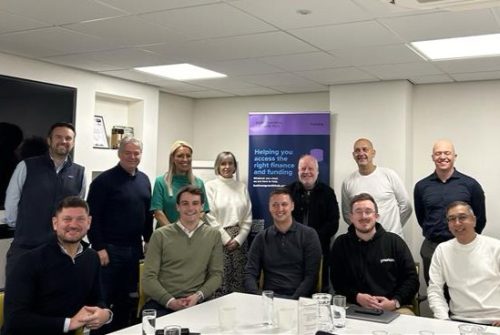Navigating the north’s funding maze: how collaboration can unlock growth

Manchester has long been hailed as the beating heart of the Northern Powerhouse, a thriving hub of entrepreneurial energy and innovation. Yet for many founders seeking to scale their businesses, the path to securing the right funding can feel like navigating a complex maze, fraught with challenges and roadblocks.
A recent roundtable discussion, hosted by the Business Desk and facilitated by the Greater Manchester Business Growth Hub, brought together a diverse group of players in the regional funding ecosystem – from venture capitalists and angel investors to public sector support providers. The conversation shed light on the realities faced by entrepreneurs, as well as the opportunities for funders to work more collaboratively to unlock growth across the North.
Bridging the Information Gap
One of the key themes to emerge was the need for greater education and awareness around the funding landscape. As Mike Harrison, from innovative concrete technology business Concretene, noted, “This is our first rodeo. We just don’t understand the intricacies of different funding schemes, regulations, and investment criteria.”
Former senior NatWest executive Heather Waters, network manager at the Access to Finance team, echoed this sentiment, highlighting the challenges founders face in simply knowing where to start. “The automatic thing, the presumption is, I’m a growing business, I should go and raise investment. So how do we take that, change that conversation to actually looking at debt?”
Ian Dixon, head of Access to Finance at the Business Growth Hub, acknowledged this gap, explaining that a core part of his team’s role is to provide advisory support – not just on funding options, but on what it means to be truly “investment ready.”
“We’re often a starting point, but we very rarely are an end point for the client,” Dixon said. “What we do, we like to think is impartial, independent, because effectively, we’re monetised directly through the mechanism of GMCA, through something called Shared Prosperity Fund.”
This impartiality, Dixon argued, allows the Access to Finance team to act as a neutral broker, guiding founders through the maze and making crucial connections within the ecosystem.
Fostering Collaboration
Indeed, the power of connections and collaboration emerged as a central theme throughout the discussion. Participants highlighted the importance of funders working together, rather than operating in silos.
“It’s not just necessarily another debt provider. It could easily be, you know, actually, what is too early for us. This is why you want to speak to a, b and c,” said Ryan Sorby, partner at Palatine Growth Credit.
Rhys Davenport, investor at BGF, echoed this sentiment, emphasizing the need for funders to “triage” opportunities and guide founders towards the most suitable sources of capital. “Depending on the sort of stage of the pyramid you’re speaking to, different funders will have to triage the process to point to a number of opportunities.”
Ben Davies, marketing director at Praetura Ventures, highlighted the positive impact of this collaborative approach. “When you’ve got someone like the British Business Bank or a Growth Company taking some of those first steps that then can have that positive knock-on effect to attracting private equity afterward, it makes sense.”
Dominic Appleby, founder of sustainable water brand H2 Origin, experienced this firsthand. After receiving investment from the Greater Manchester Combined Authority, he found that it “crystallises the business in [potential investors’] minds.”
Cultivating a Resilient Mindset
While the funding ecosystem may seem daunting, participants emphasised the importance of founders adopting a resilient mindset. Ben Davies stressed the need for entrepreneurs to treat the fundraising process like a sales funnel, learning from each interaction and refining their approach.
“If one customer has a problem, you deal with it because it’s one customer out of 200 if 20 customers have a problem, that’s a very different proposition, and actually treating it like a sales funnel, you’re only going to be able to pitch to this many deal terms from this many create a nice bit of competitive attention at the last minute.”
Rhys Davenport echoed this sentiment, encouraging founders to take a long-term view and align their funding strategy with their ultimate goals, whether that be maximising financial returns or driving social impact.
“You do need to try and detach yourself from the day to day in terms of opportunity and how you scale your business Monday through Friday. And actually it is more about that North Star of why you’re trying to trying to build it. Because if you don’t have that sort of end point, noting you’ve set up solve a problem. I think you can find yourself getting distracted and blurred.”
The Role of Advisors
Underpinning this resilient mindset is the need for founders to surround themselves with the right advisors – not just accountants and lawyers, but those who can provide strategic guidance on the funding journey.
Matt Currie, partner at Seneca Partners, emphasised the importance of early engagement with potential investors, even if they ultimately don’t prove to be the right fit. “I think where we probably see some of these conversations, mistakes and conversations kind of falling down, I think probably the biggest areas where we see that, or the biggest kind of mishaps, are people not having conversations early enough.”
Keith Benson, partner at DSW Ventures, agreed, noting that the complexity of funding schemes like SEIS and EIS means founders need expert advice to navigate the process effectively.
“There’s a real mismatch so that I can actually kill an investment by involving advisors too deeply at an early stage.”
Ian Dixon emphasised the role that the Access to Finance team can play in connecting founders with the right advisors and funding partners. “I regularly say, I don’t know, but I then normally caveat that by quickly saying, Well, I know somebody who will know, and I can connect you.”
Tapping into the Power of Peer Networks
Beyond traditional advisors, the roundtable participants highlighted the immense value of peer-to-peer learning and networking. Heather Waters, for example, shared her experience of the ASCEND programme, run by KPMG and the Business Growth Hub, which took a cohort of founders to Lisbon’s Web Summit.
Janine Smith, director of the Business Growth Hub, emphasised the importance of these types of immersive experiences, noting that the “stuff that happened, you can’t put a price on it.”
Ben Davies, who had participated in the ASCEND programme, echoed this sentiment, crediting the experience with helping him develop the “mindset, the leverage to be able to understand how I can navigate myself from a no to a yes.”
Unlocking the Next Phase of Growth
As the discussion drew to a close, the participants turned their attention to the road ahead, exploring ways in which the funding ecosystem could be further strengthened to support the North’s entrepreneurs.
Janine Smith highlighted the findings of the recent KPMG research into the funding ecosystem, which identified education amongst businesses as a key priority. “The big, big thing that came out of the back of that was education, which is what we want,” she said.
Ian Dixon agreed, noting that his team is constantly looking for ways to enhance their connections and collaboration within the wider ecosystem. “Our connectivity into the investment landscape and networks is a critical component of delivering value to our clients,” he said.
One potential avenue, suggested by Heather Waters, is the upcoming funding-focused event being organised by the ASCEND program in January. This invite-only gathering will bring together the cohort and introduce them to a range of funding providers, creating valuable networking opportunities.
“It is about, how do we bring that ecosystem to that cohort? So it’s not, it’s, you know, it’s invite only kind of event. But that’s exactly that reason, because, like, your proposition, the chances are there’s a few people there that that would be an opportunity for because at the right stage, maybe not even considered it.”
As the North continues to cement its reputation as a hub of innovation and entrepreneurship, the need for a cohesive, collaborative funding.







